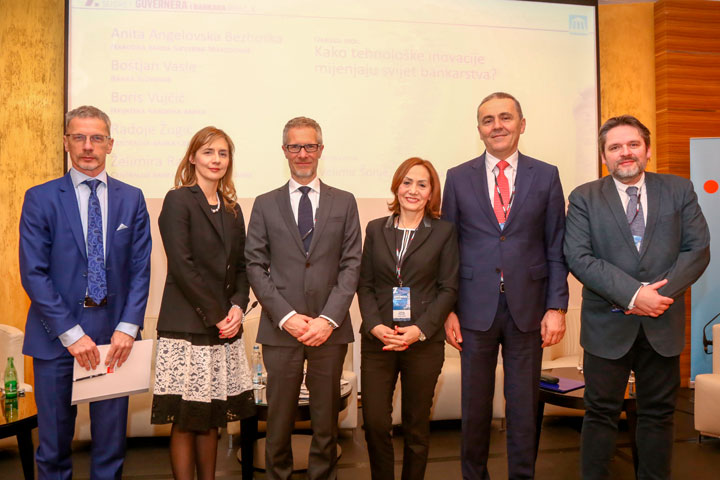
Central banks need to be extremely careful when it comes the topic of cash versus digital money; our duty is to have money available as a commodity, in the form required by the citizens without rooting for any of the possibilities. Our job is to meet market demand. Many examples from around the world show that the use of cash or digital money is dictated by the economy, but also culture, tradition and history. In many countries, citizens prefer cash regardless of its higher price, answered Governor Vujčić to first the question at the panel, FinTech challenges – potentials, transformation and regulation, held as part of the 7th Meeting of Regional Governors 2019 held today.
FinTech services are increasingly changing the world of banking. Research has shown that younger generations tend to use financial services rather than traditional banking services. New technologies offer creative solutions that may facilitate and accelerate financial transactions. Such sector transformation requires appropriate regulation.
When discussing the right degree of FinTech regulation – one that maintains a high level of security but at the same time enables service development and user satisfaction – the Governor stressed that he believes banks will adapt to new competitors, i.e. new players entering the market. Innovative solutions and technological development should not be viewed as a threat to the banking business as we know it but as an opportunity to improve the offer to consumers. Cybersecurity is the most significant of banks' systemic risk and has to be given serious attention. This, together with technological advancements, increases the importance of IT sector in the financial industry but also in regulation, underlined the Governor.
When asked by the panel moderator how does the Croatian National Bank keep up with the development and trends in the FinTech segment and what key topic have been identified, Vujčić replied that the CNB set up a FinTech task force in 2017. Its members are colleagues with different professional expertise that come from different organisational units – from the legal office, consumer protection, payment services, IT and IT risks, central banking operations, supervision, financial stability, etc. Setting up the FinTech task force, continued the Governor, has been the consequence of the CNB's intentions to bring together the work of different areas due to FinTech's multidisciplinary nature and to be able to keep pace with the rising challenges of the ever-increasing role of innovation in banking and payment industry. In addition, the Governor stressed, we aim to encourage competences and expertise regarding FinTech, and finally yet importantly, ensure a serious treatment of the relevant risks.
As early as in October 2017, seven Croatian banks and FINA set up a task force for the introduction of instant payments with a plan to introduce the system of instant payments in Croatia by the end of 2019. This platform would enable the development of new products, especially in the segment of mobile payment solutions. In addition, in accordance with the implementation of the Payment Services Directive (PSD2), some Croatian companies are in the process of obtaining the TPP authorisations from the CNB as third party providers of financial services, said the Governor at the end of the discussion, listing the examples of FinTech in Croatia.
Of the Governors participating in the round table on FinTech, in addition to Governor Vujčić there were Anita Angeloska Bežoska, the Governor of the National Bank of the Republic of Macedonia, Želimira Raspudić, the Vicegovernor of the Central Bank of Bosnia and Herzegovina, Boštijan Vasle, the Governor of the Bank of Slovenia and Radoje Žugić, the Governor of the Central bank of Montenegro, while the panel was moderated by Velimir Šonje, Arhivanalitika, Economic Analyst. The former Governor of the Bank of Israel, Karnit Flug, held the opening address on the topic of the future that FinTech brings.
The second part of the Meeting was devoted to investments in SE Europe. The opening address was held by Velimir Šonje and the panel was moderated by Milan Deskar-Škrbić, a researcher with the Modelling Department of the Croatian National Bank.
